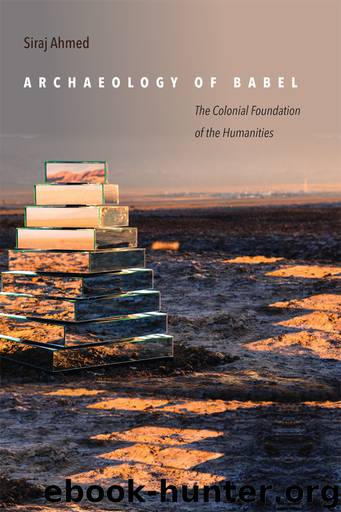Archaeology of Babel: The Colonial Foundation of the Humanities by Siraj Ahmed

Author:Siraj Ahmed [Ahmed, Siraj]
Language: eng
Format: epub
Publisher: Stanford University Press
Published: 2017-03-13T16:00:00+00:00
6. State Models and War Machines II: The Mu‘allaqāt, 550 A.D.
The originally unwritten Mu‘allaqāt comprises seven separate poems composed by seven different authors, each of whom was a member of a sixth-century Bedouin tribe. These tribes existed between Byzantine and Persian Empires and their Arab client states, all of whom wanted to incorporate—or at least circumscribe the movement of—the tribes, in order to stop their raids on desert trade routes.141 In response, the poems insist, above all, on the Bedouins’ refusal to subject themselves to any empire. Here is the conclusion to the mu‘allaqah translated as “The Regicide,” by ’Amr, who himself reputedly killed a king:
When kings deal with their peoples unjustly
we refuse to allow injustice among us.
We are called oppressors; we never oppressed yet,
but shortly we shall be starting oppression!
When any boy of ours reaches his weaning
the tyrants fall down before him prostrating.142
It is in the refusal of any external authority that Jones discerned an affinity between the explicitly antistatist Mu‘allaqāt and American republican politics. In his view, these poems articulated the consciousness that precedes the rise of writing and the state. In fact, though, they go much further, expressing not just the tribe’s rejection of transcendent sovereignty but the nomad’s disavowal of human settlement altogether. After Jones, Arabists have insisted that the Mu‘allaqāt constitutes a fundamentally different relationship between language and history—or, even more profoundly, the experience of time as such.
Each of the seven mu‘allaqah begins with a memory of settlement only to break with this experience and cancel it out. They follow the classical Arabic form of the qaṣīdah, opening with the poet’s return to an encampment in which he had had a sexual encounter but which has since been abandoned. In this opening motif (the aṭlāl, from al-wuqūf ‘alá al-aṭlāl, “stopping at the ruins”), the poet literally reads the traces of the abandoned desert encampment.143 Take for example the first lines of Labid ibn Rabia’s mu‘allaqah, called “The Centenarian”: “The abodes are desolate, halting-place and encampment too[,] / [naked] shows their trace,/ rubbed smooth, like letterings long since scored on a stony slab”; “Then the torrents washed the dusty ruins, until they seem / like scrolls of writing[.] / So I stood and questioned that site; yet how should we question rocks / set immovable, whose speech is nothing significant? / All is naked now, where once the people were all forgathered.”144 Here, as at the beginning of each mu‘allaqah, the deserted encampment becomes an inscription, “like lettering long since scored on a stony slab,” whose significance the poet must glean: “I stood and questioned that site.” Yet here inscription does not preserve or consolidate memory but in diametric opposition dissolves into the “trace” of irretrievably lost worlds: “naked shows their trace, / rubbed smooth.” The deserted encampment thus represents experience not in its content but rather in its loss; this image, paradoxically, represents loss. One could claim that, like Hafiz’s work, each mu‘allaqah is designed, therefore, to make the world fade away. The deserted encampment’s
Download
This site does not store any files on its server. We only index and link to content provided by other sites. Please contact the content providers to delete copyright contents if any and email us, we'll remove relevant links or contents immediately.
| African | Asian |
| Australian & Oceanian | Canadian |
| Caribbean & Latin American | European |
| Jewish | Middle Eastern |
| Russian | United States |
4 3 2 1: A Novel by Paul Auster(12395)
The handmaid's tale by Margaret Atwood(7769)
Giovanni's Room by James Baldwin(7348)
Big Magic: Creative Living Beyond Fear by Elizabeth Gilbert(5778)
Asking the Right Questions: A Guide to Critical Thinking by M. Neil Browne & Stuart M. Keeley(5778)
Ego Is the Enemy by Ryan Holiday(5452)
The Body: A Guide for Occupants by Bill Bryson(5099)
On Writing A Memoir of the Craft by Stephen King(4947)
Ken Follett - World without end by Ken Follett(4737)
Adulting by Kelly Williams Brown(4578)
Bluets by Maggie Nelson(4561)
Eat That Frog! by Brian Tracy(4543)
Guilty Pleasures by Laurell K Hamilton(4451)
The Poetry of Pablo Neruda by Pablo Neruda(4112)
Alive: The Story of the Andes Survivors by Piers Paul Read(4034)
White Noise - A Novel by Don DeLillo(4012)
Fingerprints of the Gods by Graham Hancock(4005)
The Book of Joy by Dalai Lama(3988)
The Bookshop by Penelope Fitzgerald(3854)
